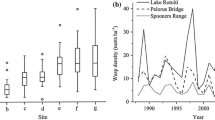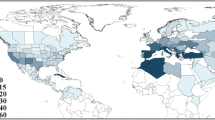Abstract
A number of hypotheses have been proposed to explain the evolution of group colony foundation (pleometrosis) in ants, but evaluating their importance under natural conditions is difficult. The desert seed-harvester ant, Messor pergandei, shows regional variation in the incidence of pleometrosis. I investigated whether there are ecological differences between the two regions that may explain the observed behavioral divergence. Pleometrosis was significantly associated with reduced precipitation, lower vegetation biomass, and lower adult colony density. These differences are consistent with the hypothesis that additional worker production in group colonies increases foraging success rather than competitive ability. The data also suggest an additional hypothesis, desiccation resistance, that should be explored. Annual variability within regions was high and far exceeded the magnitude of the differences seen between regions. Future laboratory and field experiments should take such variability into account.
Similar content being viewed by others
Author information
Authors and Affiliations
Additional information
Electronic Publication
Rights and permissions
About this article
Cite this article
Cahan, S. Ecological variation across a transition in colony-founding behavior in the ant Messor pergandei . Oecologia 129, 629–635 (2001). https://doi.org/10.1007/s004420100761
Received:
Accepted:
Published:
Issue Date:
DOI: https://doi.org/10.1007/s004420100761




